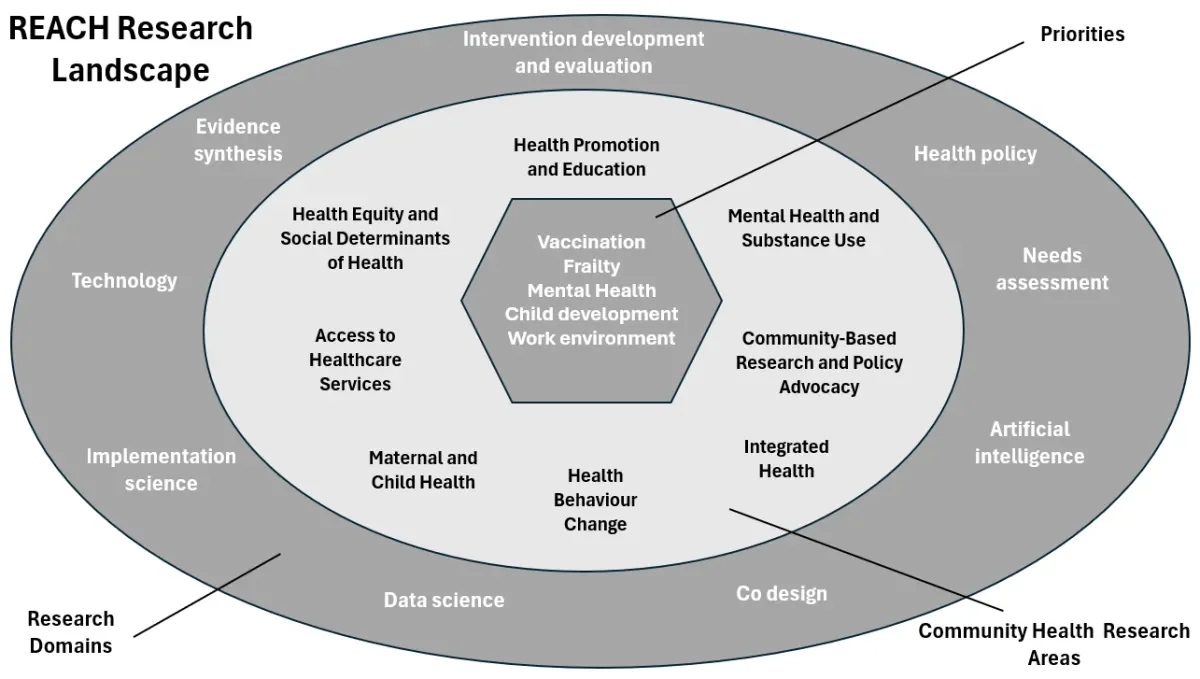Research
Research Landscape

Projects

Tobacco use is a major public health concern globally. In Ireland the prevalence of smoking is highest in areas of socioeconomic disadvantage. Smoking cessation services are key to supporting people to stop smoking however further research is required to examine engagement in such services particularly in socioeconomically disadvantaged communities.
This community-based research will examine engagement with smoking cessation services through a co-creation approach. Academics, researchers, and community partners will work together to design and implement the study tailored to the local community’s needs. In addition to contributing new knowledge, a sustainable research collaboration between partners will be established.

Project Title
Investigating a data driven approach to inform population-based resource allocation for improved equity in primary care services.
Project Context
Population-Based Resource Allocation (PBRA) is a model used for health planning that distributes healthcare resources according to the needs of the population. As part of Sláintecare, PBRA will play a key part in population planning and in combining community and critical services in the healthcare system however primary care central referral data in its current format is not sufficient for PBRA.
Project Aims/Methods
This research will:
- use a sample of primary care referral data for secondary analysis to produce evidence which will support the population-based resource allocation plan for primary care services
- systematically review evidence on methods to improve health equity in primary care resource allocation
Timeline
The project started in October 2024 for the duration of 24-months.
Research Team
The full team is listed below.
Professor Veronica Lambert (DCU), Dr Austin Warters (HSE), Professor Michelle Butler (DCU), Dr Armstrong Dzomba (DCU), Fardia Ali (DCU), Professor Sara Burke (TCD), Sarah Carberry (HSE), Dr Emma Finlay (DCU), Michelle Forde (HSE), Paul Ginnell (European Anti-Poverty Network), Dr Paul Kavanagh (HSE), Ellen O'Dea (HSE), Dr Claire Timon (RCSI), Dr Maria O'Sullivan (TCD)
Funding & Support
This research is funded by the Health Research Board Secondary Data Analysis Project [Grant Reference SDAP-2023-026].
For Further Information Contact:
Professor Veronica Lambert (DCU) @ veronica.lambert@dcu.ie
Dr Austin Warters (HSE) @ austin.warters@hse.ie

Project Title
An evaluation of the Health Service Executive (HSE) North East Inner City (NEIC) 0-5 Multi-Disciplinary Team (MDT) Infant Mental Health project
Project Context
Support in relation to Early Years development for children aged 0-5 and their families is important, particularly in socioeconomically disadvantaged areas. Recent research has revealed very significant deficits in the provision of Early Childhood Education and Care (ECEC) for the population in North East Inner City (NEIC) Dublin (CDI, 2022). Thus, there is a need for supports to be designed and provided to both children in childcare settings and those without any ECEC placement. The Health Service Executive (HSE) aims to meet this need by actively developing a toolkit of interventions to support staff and children in Early Years settings. In 2023 the Health Service Executive (HSE) set up a Steering Group (SG) of ten key stakeholders to establish a Multidisciplinary Team (MDT) to provide support to families, children, and Early Years providers in the NEIC. The MDT will use an Infant Mental Health (IMH) framework, which involves collaboration with existing service providers in the area and uses a relational way of working with families and children to support all aspects of development. The MDT will provide a tiered model of support to work primarily with the 0-3 years age group and work closely with existing Primary Care services and other services in the wider community to provide appropriate supports to children aged 3-5 years
Project Aims/Methods
This research will:
1. Explore the experiences of the Steering Group (SG) in the design and implementation of the 0-5 MDT initiative.
2. To work with key stakeholders to develop a programme logic model and evaluation plan for the initiative once it is established.
Timeline
The project started in April 2024 for the duration of 24-months.
Research Team
The full team is listed below.
Professor Michelle Butler (DCU), Dr Geraldine French (DCU), Dr Austin Warters (HSE), Dr Neil Marshal (DCU), Dr David Joyce (DCU)
Funding & Support
This research is funded within the REACH Collaboratory
For Further Information Contact:
Professor Michelle Butler @ michelle.butler@dcu.ie
Dr Austin Warters (HSE) @ austin.warters@hse.ie

This project involves nurses and social workers supporting school children and their families.

Older adults, a population for which low health literacy is prevalent, represented most people attending primary care services provided by the Health Service Executive (HSE) in 2019. Any limitation in a person’s health literacy, specifically their ability to access, understand and use health information, can affect their ability to make healthcare related decisions. Health literacy intervention evidence is also required by healthcare providers and policy makers to inform decision-making and service development to improve outcomes.
This research synthesised the evidence on health literacy interventions and health literacy-related outcomes for older adults. Existing interventions were identified, along with health literacy-related outcomes and any trends between intervention type and outcome. The findings show a link between individual-focussed health literacy interventions and positive health literacy-related outcomes in relation to older persons’ ability to understand and use health information, and that individual-focussed approaches can be utilised to achieve health literacy improvements for older persons across a range of health topics, diseases, and illnesses.
This trend suggests that implementing health literacy-related interventions directly to the individual is key.
Furthermore, our study found an inconsistency amongst the included studies in relation to the implementation of health literacy assessment tools, with different tools used across most studies, and some studies choosing not to utilise any assessment tool.

Teachback is a communication technique in which a person, often a learner, repeats back key concepts to ensure they understand information correctly. Commonly used in healthcare, education, and coaching, teachback encourages active listening, engagement, and recall by requiring the individual to put information into their own words.
This method not only confirms comprehension but also highlights areas needing clarification.
This research project follows on from the health literacy project and involves a literature review to determine how the teachback method can be used to improve health literacy in older adults.

